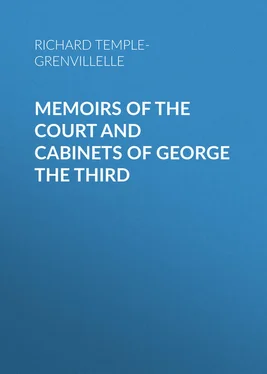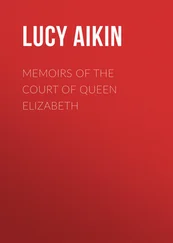Richard Buckingham and Chandos - Memoirs of the Court and Cabinets of George the Third
Здесь есть возможность читать онлайн «Richard Buckingham and Chandos - Memoirs of the Court and Cabinets of George the Third» — ознакомительный отрывок электронной книги совершенно бесплатно, а после прочтения отрывка купить полную версию. В некоторых случаях можно слушать аудио, скачать через торрент в формате fb2 и присутствует краткое содержание. Жанр: foreign_antique, foreign_prose, на английском языке. Описание произведения, (предисловие) а так же отзывы посетителей доступны на портале библиотеки ЛибКат.
- Название:Memoirs of the Court and Cabinets of George the Third
- Автор:
- Жанр:
- Год:неизвестен
- ISBN:нет данных
- Рейтинг книги:5 / 5. Голосов: 1
-
Избранное:Добавить в избранное
- Отзывы:
-
Ваша оценка:
- 100
- 1
- 2
- 3
- 4
- 5
Memoirs of the Court and Cabinets of George the Third: краткое содержание, описание и аннотация
Предлагаем к чтению аннотацию, описание, краткое содержание или предисловие (зависит от того, что написал сам автор книги «Memoirs of the Court and Cabinets of George the Third»). Если вы не нашли необходимую информацию о книге — напишите в комментариях, мы постараемся отыскать её.
Memoirs of the Court and Cabinets of George the Third — читать онлайн ознакомительный отрывок
Ниже представлен текст книги, разбитый по страницам. Система сохранения места последней прочитанной страницы, позволяет с удобством читать онлайн бесплатно книгу «Memoirs of the Court and Cabinets of George the Third», без необходимости каждый раз заново искать на чём Вы остановились. Поставьте закладку, и сможете в любой момент перейти на страницу, на которой закончили чтение.
Интервал:
Закладка:
Whitehall, Dec. 21st, 1788.
My dear Brother,
I have delayed writing for these two or three last days, in hopes of being able to give you an account of the event of our second division, which has, as you will have seen, been deferred from day to day, and now is finally fixed for to-morrow. The adjournment on Friday was necessary, on account of Pitt's health. He had entirely lost the use of his voice by a cold, so that he could not have spoken five sentences together, and he was in other respects much exhausted. Our friends were a little chagrined at the delay; but it was unavoidable, and will not, I hope, be productive of any inconvenience.
Our next question is not a pleasant one. It turns on an abstruse maxim of law, which makes it necessary for us to take a very circuitous mode of doing a very plain thing. The necessity of it is forced upon us by our lawyers, whom we could not otherwise have satisfied, with regard to the second proposition which we have voted. I am indeed convinced, that, in strict law, they are right, and that the mode now proposed is the regular and proper mode of doing what is required to be done. At the same time, it would have been more agreeable to have had a more familiar and obvious measure to defend in such an assembly as the House of Commons.
We shall probably lose some individuals, both on this question, and on the subsequent question of restrictions; but we have some new recruits, who were absent by sickness, or other accidents; so that, on the whole, I hope the difference will not be considerable, though nothing can exceed their industry in canvassing, except the open manner in which they offer every sort of bribe.
We have some idea of making the restrictions temporary, by which means they will certainly be much more palatable. You will observe that almost all the physicians seem to point out the probability of his recovering within a year or a year and a half, if at all. This seems to afford a real ground of expediency, besides giving a strong topic of argument for imposing the restrictions only for a similar time. This point is, however, not yet determined.
The accounts from Windsor for the last week, though they have varied, are yet, on the whole, less favourable than before. Willis ascribes this entirely to the effect of the blisters, which give him great pain; and Willis says that is, on the whole, by no means an unfavourable symptom. The effect, however, which these accounts produce here, is injurious to us, and must be the same in Ireland. Our solid ground of hope does not appear to be in the smallest degree weakened.
You will see in the Opposition papers that they are beginning to abuse the Queen in the most open and scandalous manner. I collect from this that they have some information, on which they can depend, with respect to her sentiments, and I conjecture that they are such as we could wish.
If we were together, I could tell you some particulars of the Prince of Wales's behaviour towards the King and her, within these few days, that would make your blood run cold; but I dare not commit them to paper, because of my informant.
The demands of the Opposition appear to have risen and fallen with the bulletins; and according as the King was better or worse, the resistance to the limitations was faint or violent. The conduct pursued by the Prince's party to obtain votes and strengthen their parliamentary influence, is not shown in a very favourable light.
SIR WILLIAM YOUNG TO THE MARQUIS OF BUCKINGHAM.
Stratton Street,
Monday, Dec. 22nd, 1788.
My dear Lord,
I should scarcely venture to anticipate a subject, the event of which within twenty-four hours may belie any pretensions of political sagacity, might not the difference of one day's post from London eventually delay your receiving a letter for a week, should wind and sea prove perverse, as when I passed my Christmas at Holyhead. This, and the anxiety for intelligence, which must necessarily arise from the suggestion in my note of Saturday, induces me to pursue the matter I then opened, and the more especially as the circumstance, I foresaw, is now more than likely to occur. As I purpose closing this letter at the House of Commons, and the last moment which the post may allow me, I shall have to transmit fact in lieu of probability; at present, I state briefly my grounds for the latter – namely, that the specific great question, whether the Prince shall be Regent without any limitations, and invested with the full prerogatives of royalty, will be agitated and decided upon this Monday night. The turn of debate and temper of the House on Friday, which induced me to suppose such question might be pressed upon us, have induced others to press it. This morning a printed paper hath been sent to certain members, containing a motion for addressing, and an address at length to the Prince, corroborating what Mr. Steele told me yesterday, that Fox's party had some design in view for Monday. Letters having been sent in Fox's name to several members, requesting attendance and an answer ; and that Mr. Pitt had written in like manner to such as he apprehended might be withdrawing for the Christmas holidays, with the same unusual request of answer . Two of these letters (pretty long), to Sir H. Hoghton and to Mr. Pye, I afterwards had the perusal of.
The true friendly language, and which I openly hold, is that we shall be stronger on the division than before; such language is proper, because ordinary men consider numbers as a shelter for their opinions and conduct, and some even consider it as the test of truth. But this language hath not its origin in my judgment and feelings. There are circumstances which impress great doubt on my mind, whether the division can be so favourable to our wishes, as was the last. Taking the data of the examination of the physicians, the King's recovery therein presumed, gives a vantage-ground in argument for limitations. But I am sorry to say this ground is now shaken: the public is no longer sanguine in hopes, medical gentlemen have generally conspired to render the object of recovery much more doubtful at least, and the physicians about the King have had dissensions and disputes amongst themselves. It is now rumoured that Dr. Warren wishes to be re-examined. All this is indeed not before the House of Commons, and the report of the physicians is; I think, therefore, that though not so decisive, we yet shall have a considerable majority on the premises; but even for this dependant on other considerations – namely, how far apprehensions of the King's actual demise may operate from, I believe, the faithful report of the day, that a fever is come on, and that for a day or two past the King has had a constant sweating of the head, to which he was at no time before accustomed. According to wishes or fears, men construe this crisis to portend health or decease; the political effect in the alternative, being in the first case uncertain, in the second case certain. The bent of this is against us, as few narrow motives and personal considerations may extend and favour the active spirit of subornation which stalks in open day, with each hand full of patents of honour and purses of money. Offers have been so prodigal that not fifty years of patronage could accomplish the performance. Those gentlemen who have rejected these kind tenders of service speak openly, and no notice is taken. In these moments of public curiosity, it may not be so well to trust names to a letter. I could give you several.
The bearing of this letter is thus unfavourable to this night's debate terminating fully as we could wish, though yet I think for us . Having thus far written, I shall pocket my paper for the purpose of adding what I can at the House of Commons.
House of Commons,
Half-past Five, Monday, Dec. 22nd, 1788.
Читать дальшеИнтервал:
Закладка:
Похожие книги на «Memoirs of the Court and Cabinets of George the Third»
Представляем Вашему вниманию похожие книги на «Memoirs of the Court and Cabinets of George the Third» списком для выбора. Мы отобрали схожую по названию и смыслу литературу в надежде предоставить читателям больше вариантов отыскать новые, интересные, ещё непрочитанные произведения.
Обсуждение, отзывы о книге «Memoirs of the Court and Cabinets of George the Third» и просто собственные мнения читателей. Оставьте ваши комментарии, напишите, что Вы думаете о произведении, его смысле или главных героях. Укажите что конкретно понравилось, а что нет, и почему Вы так считаете.












